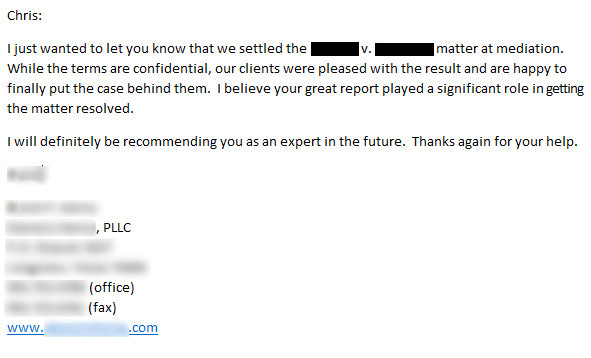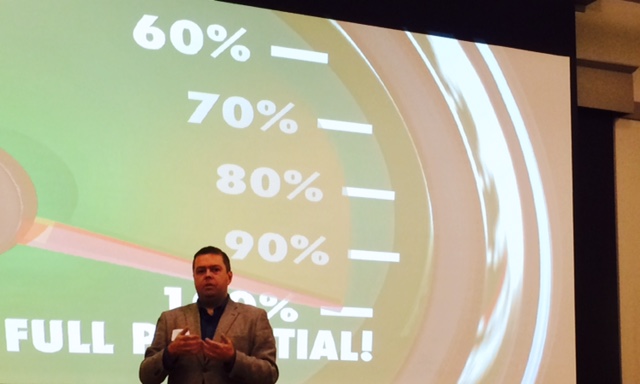You’re sailing along with no care in the world, up until that wicked person posted something bad about you online. “No problem,” you think. After all, you already have a lot of good stuff about you that’s been ranking strongly for years, like your own website, your Twitter and Facebook accounts, online directory pages, a local news story about that charity event you participated in last year, a video you made and posted on YouTube, and your LinkedIn profile. The newly made negative attack materials won’t be able to show up that quick — that stuff couldn’t possibly have the ranking power of your other solid, well-established stuff.
Or, could it?
What many discover at this point is that yes, indeed, completely new negative stuff can show up and rank pretty high in Google for one’s name searches within a breathtakingly short timeframe. In fact, someone could Tweet or blog some some nasty thing about you today, and it could show up in your name searches in Google tomorrow.

Google’s motto used to be “Don’t be evil.” But, they no longer use that motto.
- Comments Off on Does Google Hate You? 👿
- Tags: Autosuggest, Google Algorithm, Online Reputation Attacks, Online Reputation Management, ORM, Reputation Management
Argent Media is pleased to announce that we have begun marketing to Hispanic markets in the United States, as well as to Spanish-speaking markets internationally for Online Reputation Management services.
While Argent Media is primarily an English-speaking agency, we do have background in translating language processing applications and websites of Fortune 500 companies into Spanish. Search Engine Optimization (SEO) is generally a language-agnostic discipline, since the function of search engines tends to be consistent across languages. However, many agencies solely focus upon English-speaking markets all while there is growing need for help among Latin-American and other Spanish-speaking populations.
“We have recognized that online brand identity and reputation issues occur in Latin-American countries, via Hispanic media, and in Spanish search results,” states Argent Media’s CEO and founder, Chris Silver Smith. “So, we are now extending services to assist individuals and companies that are struggling with online reputation issues.”
Argent Media has launched a site specifically to cater to Spanish-speaking markets: Reputación Online.
Argent Media has increasingly specialized in assisting clientele with online reputation issues including: online reviews, negative items appearing in Google and Bing search results, damaging image search results, mugshots and arrest records, boyfriend/girlfriend revenge websites, defamation lawsuits, and more.
Visit Reputación Online for more information at: https://reputación.online/
- For more online reputation background, see Reputacion Online at Wikipedia.
- For articles on internet reputation by Chris Silver Smith, see his Online Reputation advice column at Marketing Land.
[Related: reputación online | reputación en línea | reputación en la red ]
- Comments Off on Announcing Spanish Online Reputation Management Services
- Tags: internet reputation, online reputation, ORM, reputación en espanol, reputación en la red, reputación en línea, reputación online, Spanish reputation management agency, Spanish search engine optimization, Spanish SEO
Google Seems To Have Stopped Removing Defamation
In: Industry News & Happenings|Online Reputation Management - ORM
9 Jan 2017At the end of December, I reported at Search Engine Land on what what seems to have been a major change in Google’s internal policy. (See: Paradigm shift: Has Google suspended defamation removals?) Google has effectively begun to decline requests to remove defamation from its web search results, although it has been honoring those takedown requests for many years now, when accompanied by properly-executed court orders.

While I phrased the title of that article “Has Google…” and ended with a question mark, the reality is that the company has completely stopped removing URLs for defamation. The Search Engine Land editors and I opted for that interrogative title phrasing because Google declined to make any official statement about the matter. This lack of transparency around this has created a lot of consternation among attorneys who deal with online defamation, along with their clients — I polled a number of attorneys across the country and consistently found they had all encountered a change in their dealings with Google in the past few months. It seems that some stuff that was already being processed prior to Google’s apparent policy change may still be acted upon, but most new requests are getting denied with no reason provided. Read the rest of this entry »
- Comments Off on Google Seems To Have Stopped Removing Defamation
- Tags: defamation, defamation attacks, defamation court orders, defamation removals, defamatory content, Google defamation removal, Google libel removal, libel, libel removals, online libel, Online Reputation Management, ORM, remove search engine results
Chris Silver Smith To Present At SMX West 2017 On Aspects Of Internet Trademark Law
In: Branding & Trademarks|Industry News & Happenings|Legal Expert Witness
5 Jan 2017Issues involving the application of trademark laws relative to online media content have been present since the beginning of the internet. However, the legal ramifications of how trademark infringement may be evaluated and litigated have evolved over time, and company executives and internet marketers may be unaware of the options and risks involved with their online activities.

Chris Silver Smith will speak at SMX West 2017.
Those educated in the basics of business law are aware that infringing upon a company’s marks may open one up to liabilities, if a claim of trademark infringement is made. However, if traditional online marketing activities are also involved in a trademark dispute, there is now significant potential that damages could become multiplied. Combining Search Engine Optimization (“SEO”) and/or online advertising — such as Pay-Per-Click ads (“PPC”) — with occurrences of trademark infringement, may increase the instances of “misimpressions”, which are individual exposures of a company’s marks used in an improper context. Total numbers of misimpressions may be accounted by courts in determining the degree of infringement, and used as a basis for calculating damages to be awarded to a plaintiff.
Chris Silver Smith, a frequent legal expert witness and experienced online marketing consultant, will bring valuable insights to these topics, based upon his experiences in working on “PODS Enterprises, Inc. v. U-Haul International, Inc.”, a landmark federal trademark infringement lawsuit (see “U-Haul Boxed In With $60M Verdict In PODS Trademark Suit“). Read the rest of this entry »
- Comments Off on Chris Silver Smith To Present At SMX West 2017 On Aspects Of Internet Trademark Law
- Tags: Chris Silver Smith, internet marketing lawsuits, misimpresions, online infringement, PPC, SEO, SMX West, trademark infringement, trademark infringement expert witnesses, trademark infringement experts, trademark lawsuits
GOP Elector’s Reputation Attacked With Ashley Madison Data After He Says He Won’t Vote Trump
15 Dec 2016A year ago, I stated that the Ashley Madison hacking scandal was not over, and that is proven yet again. A member of the Electoral College has now had his reputation attacked online using details from the Ashley Madison data and other apparent details from his life, because he wrote an op-ed for the New York Times declaring his intention to not cast his vote for Donald Trump for president.

The Texas elector in question, Christopher Suprun, wrote a piece on December 5th, “Why I Will Not Cast My Electoral Vote for Donald Trump“, where he described how he had decided not to cast his Electoral College vote for Trump based on his principles. An elector that opts not to vote for the presidential or vice-presidential candidate for which he or she has pledged to vote is called a “faithless elector”, and is something of a rarity. Since the beginning of the United States, there have only been about 179 faithless electors out of over 20,000 total electors — so, less than 1% of electors have ever turned rogue.
Following Suprun’s published intention to not cast his electoral vote as pledged, there was a lot of online recriminations against him. He’s been insulted, castigated and threatened. But, perhaps even more harmfully, Suprun has now been targeted by the conservative-leaning yellow press site, GotNews.com, which is the brain-child of Charles C. Johnson, who was declared by Gawker to be “The Web’s Worst Journalist“.
On December 12th, Got News published a tawdry slam-piece that claims that Christopher Suprun was Read the rest of this entry »
In my recent article, I predicted that the worst was far from over for Ashley Madison users whose personal information was exposed by the massive hacking. Indeed, our research has now uncovered that over 500 domain names have been registered, indicating that the next stage of this reputation apocalypse is about to happen.
Chris Silver Smith Interview @ Webcertain TV: Online Reputation Management – The Dark Side of the Internet
26 Jun 2015Argent Media CEO, Chris Silver Smith, was interviewed recently by Gemma Birch of Webcertain TV on the topic of “Online Reputation Management – The Dark Side of the Internet”.
Description:
“It has never been easier to create smear campaigns and publish defamatory content online – and the impact of such campaigns on individuals can be huge. Chris Silver Smith discusses the challenges the industry faces to reduce this, the responsibility of search engines and social networks to remove content and how individuals can help to protect themselves.” Read the rest of this entry »
- Comments Off on Chris Silver Smith Interview @ Webcertain TV: Online Reputation Management – The Dark Side of the Internet
- Tags: Bing and Reputation, CEOs, Chris Silver Smith, Google and Reputation, online defamation, Online Reputation Management, ORM
Argent Media CEO Chris Silver Smith to Speak at Local Search Advantage Workshop
In: Industry News & Happenings|Local Search|Online Reputation Management - ORM
19 May 2015As part of the SMX Advanced Conference in Seattle, Chris Silver Smith, Argent Media CEO, will be speaking at the Local Search Advantage Workshop on June 4, 2015.
The Local Search Advantage Workshop provides a deep dive into many of the primary aspects of local marketing, covering all of the topics necessary for local businesses to be found online by buyers when they’re looking to purchase.
Chris Silver Smith will be presenting a session titled “(Re)Building Your Online Reputation” which will cover: Read the rest of this entry »
New Column Covering Online Reputation Management
In: Industry News & Happenings|Online Reputation Management - ORM
17 Apr 2015I’ve been very excited that Search Engine Land‘s editors have recently allowed me to start a new column series dedicated to Online Relationship Management, which will be published on their sister site, Marketing Land! My first article for it, “9 Key Points for Cleaning Up Your Online Reputation Nightmare Via SEO“, appeared a few weeks ago. In that article, I tried to provide some basic steps for people who wish to try the do-it-yourself approach, or for agencies less familiar with this type of work.
I’ve worked at various aspects of Online Reputation Management (“ORM”) for a number of years now, as a sideline of Search Engine Optimization (“SEO”). This has involved a whole range of aspects of ORM — from handling local business reviews, fighting RipOff Report pages, removing lies and defamation from Wikipedia, and helping clients to deploy websites and social media accounts to counter and displace negative materials that damage their reputations.
I’m fascinated by the human stories involved with ORM work — it’s highly compelling to me because it has such a big impact upon people’s lives, compared to the mere jockeying to attain high rankings for commercial keyword phrases. To a large degree in the interactive world of today, your name is equivalent to your identity. You don’t realize just how much your online identity is central to your relationships and success in the real world until it becomes damaged — the perceptions created by the materials that appear when your name is searched in Google, Bing and other search engines is nearly inseparable in people’s minds from your actual identity.
I’m compelled to work in this area by the human stories and how much my work can help people so directly. I have come to know so many things through the various cases I’ve worked upon — fascinating stories about what often happens behind-the-scenes to what you see in the shallow surface you see represented in the search results. Read the rest of this entry »
- Comments Off on New Column Covering Online Reputation Management
- Tags: defamation, defamatory attacks, defamatory webpages, internet reputation, libel, online attacks, online identity, online reputation, ORM, Reputation Repair
One melodrama I see played out time and again is caused by the disconnect between an individual’s desires for data privacy, and the need for good, proactive online reputation management. Many well-educated people think that by not having much about themselves on the internet, they’re protecting themselves and their families. They’re both wrong and right.
It’s absolutely true that you don’t want to have your data spread across the public internet, willy-nilly. You don’t want people to readily find your home address, your phone number, your birth date, and many other details, such as where you will (or won’t) be at certain times and dates. You don’t want to make it easy to be victimized — limiting data sharing can keep your identity from being stolen, your bank account logins compromised, and your home from being burglarized while you are away.
Unfortunately, people equate good data security practices with not having Twitter accounts, Facebook profiles, or personal websites and other social media accounts. Even the desire to avoid having digital copies of your photograph on the internet may fit into this category of misguided concerns.
This extreme avoidance of having any presence at all on the internet creates a big fat hole in one’s online reputations. Nature abhors a void and seeks to fill it, and the internet is no exception. Read the rest of this entry »
I discovered last year that a few online reputation agencies are partners-with or owners-of the very reputation-damaging sites that their clients seek their help in addressing. Perhaps the worst of these types of sites are “revenge-porn” sites that encourage individuals with no ethics to supply nude photos of ex-boyfriends and ex-girlfriends for the purpose of embarrassing them and damaging their reputations.
There are other sites that similarly focus on promoting materials that damage individuals’ reputations in addition to revenge porn — mugshots sites, arrest records sites, and tawdrier business review sites — and, these types of sites frequently are reliant upon thinly-veiled extortion demands. Essentially, the focus on obtaining defaming content and rendering it highly-visible through search engine results, and then they require people to pay them to take it down or modify it to be less-damaging..
A number of us who work in online reputation management (“ORM”) have sought to apply pressure to remove these sites’ ability to make money. These efforts have made a little impact, here and there. Some credit card companies have taken the step of refusing to allow merchant services for these companies, because they recognize that they’re highly distasteful. I suspect that there may have also been higher percentages of charge-backs on transactions as well. But, due to the rising barriers to the reputation attack sites, some have come up with schemes to dupe consumers into thinking they’re paying others to get the negative materials cleaned-up. Read the rest of this entry »
About [Ag] Search Blog
[Ag] is the symbol for the element Silver and is 47th in the periodic table of elements, an abbreviation for the Latin word for Silver, "Argentum". The [Ag] Search Blog is provided by Argent Media™.
Sharing research, thoughts, commentary about Internet Marketing, SEO, Social Media, Online Reputation Management, and our SEO Expert Witness services.
Photostream
Categories
- Branding & Trademarks (1)
- Industry News & Happenings (31)
- Legal Expert Witness (5)
- Local Search (16)
- Local SEO 101 (5)
- Online Reputation Management – ORM (26)
- Rich Snippets (3)
- Author Markup (2)
- Recipe Rich Snippets (1)
- Search Engine Optimization – SEO (13)
- Search Engines (10)
- SEM (1)
- Google Ads (1)
- Pay-Per-Click (1)
- Shopping Search (1)
- Social Media (14)
- Facebook (3)
- Google Plus (1)
- Twitter (2)
Archives
- June 2024
- January 2023
- September 2021
- December 2020
- May 2020
- December 2019
- October 2019
- March 2019
- January 2019
- November 2018
- October 2018
- September 2018
- July 2018
- June 2018
- January 2018
- November 2017
- October 2017
- July 2017
- January 2017
- December 2016
- March 2016
- September 2015
- August 2015
- June 2015
- May 2015
- April 2015
- March 2015
- February 2015
- June 2014
- April 2014
- October 2013
- September 2013
- August 2013
- March 2013
- February 2013
- January 2013
- December 2012
- November 2012
- July 2012
- June 2012
- May 2012
- March 2012
- February 2012
- January 2012
- Chris Silver Smith: I was approached by the Department of Justice some years ago to provide testimony regarding the pote [...]
- Sean Fagin: Interesting - I had not thought of this niche in SEO! I might have to try out doing this myself. Ho [...]
- How to Make Friends with Influencer Marketing - [Ag] Search Blog: […] My grant from the Chris Smith Institute for Exotic Travel was enough to cover both days of [...]
- Chris Silver Smith: Good point about Gawker being a muckraking site in of itself. But there are a number of others who [...]
- Rob M: Referencing Gawker for character assassination isn't so helpful since they were sued into oblivion b [...]
- AI: The Next Big Thing That “Kills” SEO
- What is an SEO expert called?
- Bob Ross Documentary Creates Huge Reputation Damage for Bob Ross, Inc.
- Online Reputation Management Services
- How does one become an SEO Expert Witness?
- What is an SEO Expert Witness?
- Local SEO Workshop Coming to SMX West 🧭
- Keynote at International Search Summit: International Reputation
- Hear About Twitter Optimization at Content Marketing Conference
- Reflections on Reputation – the New(ish) Quality Signal & Ranking Factor
![[Ag] Search Blog -](https://agsearchblog.com/wp-content/themes/compositio/logo.png)















How To Review / Moderate Comments On Facebook BEFORE They Are Posted
In: Facebook|Online Reputation Management - ORM
17 Mar 2016Whenever we have managed Facebook pages for businesses or individuals that are the target for online reputation attacks, I’ve been struck with how odd it is that Facebook doesn’t provide an option to allow all comments to be automatically moderated so that one may review them and approve or disapprove them before being published. It seemed like a glaringly obvious need for a great many businesses, and I can see that others out there would also like this option.
I’ve developed a workaround that essentially provides the ability to set all your Facebook page comments to be automatically moderated, and we’re providing this solution for free — so read on! Read the rest of this entry »